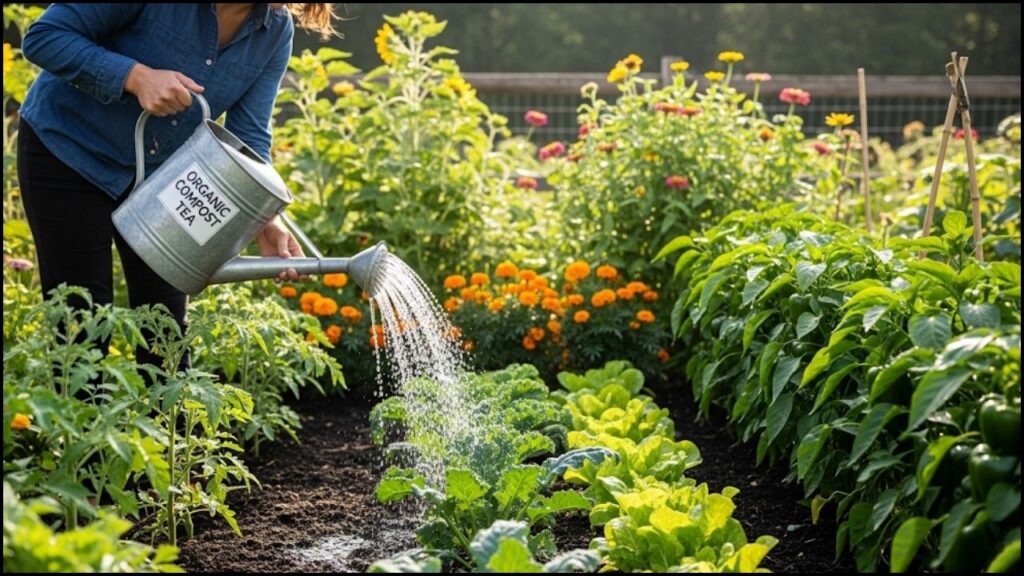
Among these, organic compost tea is gaining renewed attention from both amateur gardeners and agricultural scientists for its potential to improve soil health and plant vitality. This naturally derived liquid fertilizer, long used by experienced growers, is now the subject of increased research into its microbial and nutritional benefits.
The Scientific Basis for Organic Compost Te
Compost tea is a liquid fertilizer created by steeping mature compost in water. The process extracts beneficial microorganisms and water-soluble nutrients from the compost, creating a potent liquid supplement for plants. According to Dr. Lena Petrova, a soil microbiologist at the University of California, Berkeley, the primary benefit of the tea lies in its biological component. “It’s not just about the nutrients,” Petrova stated in a recent symposium. “The diverse community of bacteria, fungi, protozoa, and nematodes in a high-quality compost tea helps build a robust soil food web, which is essential for nutrient cycling and disease suppression.”
The liquid form allows for a different application method than solid compost. When applied directly to the foliage, it can coat plant leaves with beneficial microbes that outcompete harmful pathogens. When applied to the soil, these microbes can colonize the root zone, improving nutrient uptake and overall plant resilience. This dual action is a key differentiator from standard granular fertilizers, which typically only address the soil’s chemical composition.
Understanding the Efficacy of Brewed vs. Unbrewed Tea
The preparation method significantly impacts the final product. There are two primary types of compost tea: passively extracted (or unbrewed) and actively aerated. Passive tea is made by simply soaking compost in a bag within a bucket of water. This process extracts a small fraction of the compost’s life. Actively aerated tea, in contrast, uses an air pump to brew the mixture, much like an aquarium pump. This aeration promotes the rapid multiplication of aerobic microbes.
“The actively aerated process is where the magic happens,” said Dr. Marcus Thorne, a senior research fellow at the Oregon State University’s Center for Sustainable Agriculture. “By providing oxygen and a food source like molasses or kelp, you create a microbial explosion. This yields a much more potent and biologically active solution.” However, Thorne cautions that the quality of the finished product is entirely dependent on the quality of the initial compost.
Addressing the Variable Nature of Compost Tea
While proponents highlight the benefits, the scientific community notes the variability in results. Unlike commercial fertilizers with standardized nutrient ratios, the composition of compost tea can change dramatically based on the ingredients, brewing time, water quality, and environmental conditions. The National Gardening Association (NGA) has published guidelines stressing the importance of using high-quality source materials and clean, chlorine-free water. The NGA also advises against using compost tea with a foul odor, which may indicate the presence of harmful anaerobic bacteria.
This lack of standardization has led to some skepticism. Some horticultural professionals argue that the effects are often inconsistent and difficult to replicate. “For large-scale commercial operations, compost tea can be a challenging solution due to the batch-to-batch variability,” explained Maria Hernandez, a consultant with AgroSolutions Inc. “However, for home gardeners seeking to improve their soil’s long-term health, it remains a valuable tool.”
The Broader Context of Soil Health
The widespread embrace of organic compost tea points to a broader movement toward sustainable gardening practices. Decades of relying on synthetic, salt-based fertilizers have stripped many soils of their vital microbial communities and organic matter. This has necessitated an increased dependence on chemical inputs to maintain plant growth. The re-focus on soil health is seen by many experts as a necessary course correction.
Dr. Evan Roberts, a professor of sustainable agriculture at the University of Wisconsin-Madison, noted that the popularity of organic solutions reflects a shift in gardener mindset. “People are moving away from simply feeding the plant and toward feeding the soil,” Roberts said. “This is a fundamental change. By building healthy, living soil, you create a self-sustaining system that supports robust plant growth naturally.” This approach is not about a single product but about a holistic system where the soil itself is treated as a living ecosystem.
A Step Toward Regenerative Practices
The renewed focus on organic solutions like compost tea represents a forward-looking trend in both home gardening and commercial agriculture. While it requires more effort and attention to detail than simply pouring a chemical solution from a bottle, its benefits healthier plants, improved soil structure, and a reduced environmental footprint align with the goals of a growing number of gardeners. The practice is not a universal cure-all, but when executed properly, it can serve as a cornerstone of a more resilient and productive garden ecosystem. The debate among experts continues to highlight the need for further research, yet the practical, long-term results of growers underscore its enduring appeal.
Expert-Recommended Companion Plants for Sunflowers: A Guide to Sustainable Gardening
